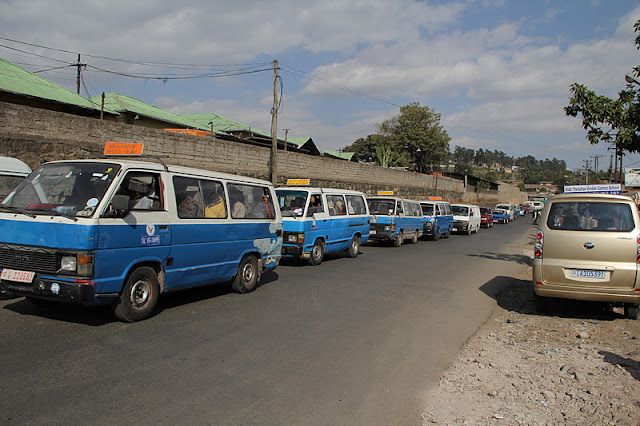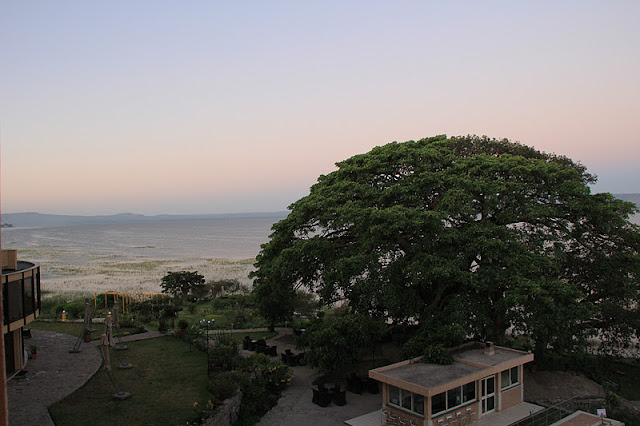As we drove back to Addis Thursday night, it really struck us how polluted the city is. We had noticed it when we were there early on in our trip, but I guess had forgotten while we were in Adama and Awassa (even though both of those cities had quite a bit of pollution themselves).
With a population of somewhere around 5 million people, and probably 1/2 that number of taxis & minibuses scuttling around the city, the exhaust was overwhelming. It really makes me thankful for the US's tough pollution standards, and California's especially.
We spent the last day and a half cruising around the city doing what we could to help the economy. :) There are lots of beautiful silver pieces available, and while I only bought a few things to bring back as gifts it was fun looking at all the intricate pieces in the stores.
After finding the scarves, wooden carvings and linens I wanted to bring home to remember my trip by, it was fun to just tour the shops with my camera. Most of the shop keepers were more than happy to let me take pictures, although some indicated a donation would be required if a photo was taken. I just moved on in those stores.
Throughout the trip our driver Amir had mentioned how much he'd like to have a Landcruiser to take people around in. With the amount of off-roading that we did in his little Toyota van, Adrian felt it was only right that we all chip in to buy Amir his dream car.
One contrast that I just couldn't get over was the corrugated tin roofs of the 'shacks' many people lived in....dotted with satellite dishes. Throughout our trip we noticed images like this, including an abundance of cell phone towers throughout our drives. Even in the most remote locations of the National parks that we visited, all of us still typically had 4-5 bars worth of signal. It seems the US could take note of the cell phone infrastructure in Ethiopia a bit and improve our coverage!
After our shopping adventures, we headed back to the Hilton to pack our bags...hoping all of our purchases fit in the luggage we brought.
We were on our way to the airport by 8pm, fortunately arriving 3 hours before our scheduled departure. When we arrived at the airport we were informed that Lufthansa's computer system had crashed and we would be checking in using Ethiopian airlines. This process, along with passing through customs, took an extremely long time and by the time we got to our gate to board we had about 5 minutes before our scheduled take-off. Luckily, we weren't the only ones in that situation so the plane waited and we took off about an hour behind schedule. With 5 hours to kill at Frankfurt, we weren't too concerned that we'd miss our connecting flight to LAX.
After a long 24 hours of travel time, we arrived back in the States. Our journey was over, and it was back to reality. This trip would be something I would remember for a lifetime. Amazing people met along the way, coworkers who were now like family to me. A new appreciate for all of the things we take for granted here in the US...someday I hope to go back, possibly on another volunteer trip...but if not, just to see the beautiful country again. Dehna hugni
With a population of somewhere around 5 million people, and probably 1/2 that number of taxis & minibuses scuttling around the city, the exhaust was overwhelming. It really makes me thankful for the US's tough pollution standards, and California's especially.
We spent the last day and a half cruising around the city doing what we could to help the economy. :) There are lots of beautiful silver pieces available, and while I only bought a few things to bring back as gifts it was fun looking at all the intricate pieces in the stores.
 |
| no helmet laws here...this guy decides to use one, but I'm not sure how effective it would be! |
After finding the scarves, wooden carvings and linens I wanted to bring home to remember my trip by, it was fun to just tour the shops with my camera. Most of the shop keepers were more than happy to let me take pictures, although some indicated a donation would be required if a photo was taken. I just moved on in those stores.
Throughout the trip our driver Amir had mentioned how much he'd like to have a Landcruiser to take people around in. With the amount of off-roading that we did in his little Toyota van, Adrian felt it was only right that we all chip in to buy Amir his dream car.
One contrast that I just couldn't get over was the corrugated tin roofs of the 'shacks' many people lived in....dotted with satellite dishes. Throughout our trip we noticed images like this, including an abundance of cell phone towers throughout our drives. Even in the most remote locations of the National parks that we visited, all of us still typically had 4-5 bars worth of signal. It seems the US could take note of the cell phone infrastructure in Ethiopia a bit and improve our coverage!
After our shopping adventures, we headed back to the Hilton to pack our bags...hoping all of our purchases fit in the luggage we brought.
We were on our way to the airport by 8pm, fortunately arriving 3 hours before our scheduled departure. When we arrived at the airport we were informed that Lufthansa's computer system had crashed and we would be checking in using Ethiopian airlines. This process, along with passing through customs, took an extremely long time and by the time we got to our gate to board we had about 5 minutes before our scheduled take-off. Luckily, we weren't the only ones in that situation so the plane waited and we took off about an hour behind schedule. With 5 hours to kill at Frankfurt, we weren't too concerned that we'd miss our connecting flight to LAX.
After a long 24 hours of travel time, we arrived back in the States. Our journey was over, and it was back to reality. This trip would be something I would remember for a lifetime. Amazing people met along the way, coworkers who were now like family to me. A new appreciate for all of the things we take for granted here in the US...someday I hope to go back, possibly on another volunteer trip...but if not, just to see the beautiful country again. Dehna hugni























































